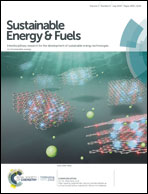Cooperative valorization of lignin and residual sugar to polyhydroxyalkanoate (PHA) for enhanced yield and carbon utilization in biorefineries†
Abstract
Lignin valorization is essential for a sustainable and economically viable biorefinery. Despite the recent efforts, it is still unclear how the reactivity of native lignin can be improved by pretreatment in a biorefinery and how different components in biorefinery residue especially residual sugar contribute to bioconversion in biorefineries. In the present study, co-utilization of lignin and limited glucose was first evaluated and proved to facilitate lignin conversion and polyhydroxyalkanoate (PHA) production. A new integrated biorefinery was then designed to cooperatively valorize lignin and residual sugar for improving the PHA yield and utilization efficiency of biorefinery residue. By the design of integrated biorefinery, the glucose and xylose yield were 91% and 73%, respectively, which increased by 18% and 12% compared with that only using sodium hydroxide pretreatment. Approximately 85% of the lignin was dissolved into a liquid stream with the integrated biorefinery, corresponding to an increase of 69% compared with that only using sodium hydroxide pretreatment. More than 70% of the residual sugar was released from the biorefinery residue, producing the soluble lignin stream that contains both lignin and residual sugar for synergistic bioconversion. Bioconversion of the soluble lignin stream with Pseudomonas putida KT2440 produced 1.5 g l−1 PHA, representing the record titer of PHA from biorefinery residue. The lignin characterization results from nuclear magnetic resonance and gel-permeation chromatography showed that the integrated process significantly reduced the lignin molecular weight, broke down more β-O-4 and β-5 linkages, and enriched the H-lignin content. Alongside the increased residual sugar concentration, the bioconversion performance of soluble lignin to PHA was significantly improved. Overall, the integrated biorefinery increased the fermentable sugar yield and improved the PHA production from biorefinery waste by cooperative valorization of lignin and residual sugar, which shows potential advantages for biorefinery sustainability.



 Please wait while we load your content...
Please wait while we load your content...